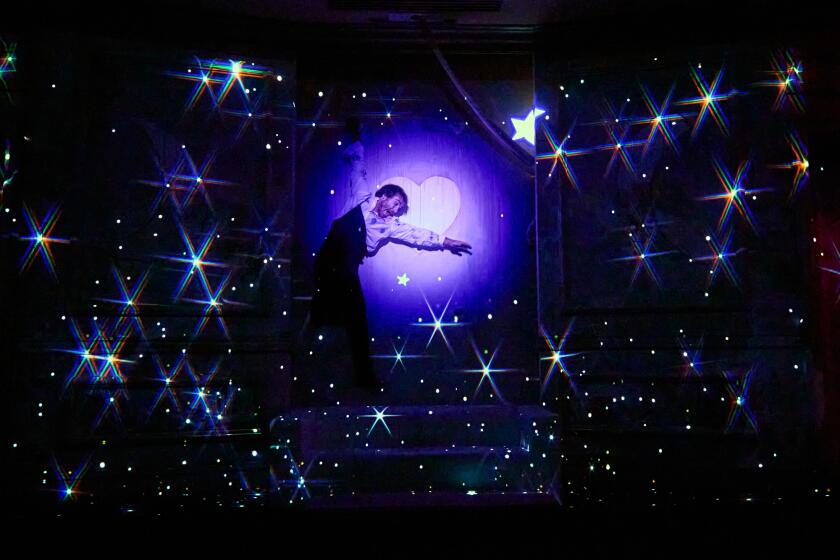‘Once a Man’: The Saga of a Coal Miner’s Son
“Have you ever wondered what would have happened if you’d stayed in your hometown?”
*
So opens Joe Lucas’ one-man show “Once a Man, Twice a Boy” at Theatre West. For Lucas, the question is rhetorical. If he had stayed in his small Pennsylvania hometown, he would have most likely mined coal, contracted black lung and died.
Lucas is an anomaly, the first male in his family in generations to escape a grinding life of labor in the coal mines. When he was awarded a full athletic scholarship to UCLA, it was a lifeline, his chance to break the cycle.
The play opens with a death watch. Lucas has returned home for the first time in 10 years because his father is dying of black lung. Very much the outsider now, Lucas feels all the guilt of the survivor. In the interval before his father succumbs, he reminisces about his family history.
And what a history it is. Ably assuming a multitude of personas, Lucas enthralls us with tale after tale of the fighting-Irish Lucas clan. However, Lucas’ play reverberates as more than a mere autobiographical drama. This is a sweeping chronicle of mining history, before unions, government regulations and safety codes. The rapacity of the bosses, the systemic corruption, the callous use of child labor, the utter disregard for human life are all threads in Lucas’ vivid design.
Mark W. Travis, who has directed a plethora of one-man shows, including the critically acclaimed “Time Flies When You’re Alive” a few seasons back, has helped Lucas shape his venture for months. Their efforts meld into a formidable whole.
An epic generational saga, “Once a Man, Twice a Boy” is a rich vein of the real stuff.
* “Once a Man, Twice a Boy,” Theatre West, 3333 Cahuenga Blvd. West, Los Angeles. Fridays-Saturdays, 8 p.m.; Sundays, 2 p.m. Ends June 12. $15. (213) 851-7977. Running time: 1 hour, 40 minutes.
‘Cocktail Party’ Loses Its Fizz
*
T.S. Eliot’s “The Cocktail Party,” at the Burbage, is an arcane amalgam that is part drawing-room comedy, part mystical exegesis and part downright psychobabble.
Nowadays, the psychobabble wears a bit thin.
When the play was first produced in 1950, it was no doubt novel, even mildly revolutionary, to hear characters discuss their innermost emotions with such candor and at such length. Nowadays, when relative strangers plunge into the most grisly personal revelations at the drop of a canape, these characters’ endless confessional chatter strikes one as merely self-absorbed and self-indulgent.
A superb performance by Alexander Zale as the mysterious stranger makes this three-hour-plus evening move more quickly--although not quickly enough. Rebecca Bonar is excellent as the vapid busybody who is in actuality super-human and all-wise, as is William Lithgow as a mincing magus with similar powers.
Alley Mills (best known for her role as the mom on the long-running television series “The Wonder Years”) is elegant but restrained as the dissatisfied wife. Loren Lester, who plays a philandering middle-aged barrister concerned about his own mortality, is simply too young for the role.
A healthy spirit of iconoclasm could have enlivened this somewhat stuffy production, but Lester, who also directed, is more reverent than revisionist, and seems overawed by the piece’s pedigree.
Ultimately, this cocktail party is a still-life, and even the mysticism rippling under the surface cannot enliven it.
* “The Cocktail Party,” Burbage Theatre, 2330 Sawtelle Blvd., West Los Angeles. Fridays-Saturdays, 8 p.m. Ends June 4. $15. (310) 478-0897. Running time: 3 hours, 10 minutes.
Alice B. Toklas and a Companion
*
Win Wells’ “Gertrude Stein and a Companion” at the Playbox is a sensitive and tasteful recapitulation of the lives of Stein and her lifelong friend, Alice B. Toklas.
Well content to live in the towering shadow of Stein’s genius, Tolkas has often been dismissed as a mere amanuensis. Wells’ intimate, two-woman “chamber piece” portrays Stein as we have always imagined her: big, blustering, self-confident, egoistic. However, it is Wells’ take on Toklas that really galvanizes the piece.
Under all the tittering mousiness, this Alice possesses a steel-reinforced backbone and a mordant wit. Although Toklas was undoubtedly Stein’s worshipful mentor, she was also a promotional genius whose determined efforts on Stein’s behalf made her a world celebrity.
Jane Singer has been cast against type as Stein, and is hard-pressed to convey Stein’s gruffness and massive physicality.
Lois Viscoli captures the essence of the plain, passionate Alice, who lived through her dear Gertrude but was not dominated by her.
Director Melanie White has lovingly enclosed the piece in the Playbox’s little jewelry case stage, the ideal setting for Stein’s famous salon.
* “Gertrude Stein and a Companion,” Playbox Theatre, 1955 Cahuenga Blvd., Hollywood. Saturdays, 8 p.m.; Sundays, 3 p.m. Ends June 12. $15. (213) 660-8587. Running time: 1 hour, 35 minutes.
‘Prickly Pears’ a ‘Fox’-Like Play
*
A bad play is always hard to take. However, when a play that holds real promise, such as Sharon R. Beatty’s “Prickly Pears” at the Powerhouse, turns abruptly awful in its final moments, it’s particularly painful, almost the violation of a trust.
“Pears” is Beatty’s first professionally produced work, and if it is not always assured, it is at least consistently compelling--until the disastrous denouement.
Beatty’s plot is not novel: Two lesbians living in rural isolation have their serenity shattered when a handsome young man intrudes into their lives and relationship.
The plot echoes D.H. Lawrence’s “The Fox,” right down to the use of wild-animal-as-sexual-metaphor. The difference is that Lawrence’s characters are repressed Brits, while Beatty’s are women of color with absolutely nothing repressed about them.
Massive, defiantly independent Willi (Leontine Guilliard) and pretty Gracie (Eisa Davis) have been companions since girlhood.
These women share a past--and a secret. When Jimmy (Yule Caise), a figure from that past, tracks these foxes down to the Nevada desert where they have gone to earth, the fur flies.
A couple of hours into her play, Beatty panics. Uncertain how to close the piece, she resorts to a ludicrous and unmotivated mad scene that closes the evening out with a resounding fizzle, the unmistakable sound of a dramatic invention collapsing in on itself.
* “Prickly Pears,” Powerhouse Theatre, 3116 2nd Street, Santa Monica. Thursdays-Saturdays, 8 p.m.; Sundays, 7 p.m. Ends June 26. $15. (213) 660-8587. Running time: 2 hours, 10 minutes.
Uninvolving ‘Price’ at Cal State L.A.
*
How is it that a decent play, competently staged and performed, can leave one cold? The question presents itself during Arthur Miller’s “The Price,” an East L.A. Classic Theatre production at Cal State L.A.’s Arena Theatre.
Miller’s play about paths not taken and brotherly betrayal is a veritable “Rashomon” of conflicting perceptions. Various actors alternate in the cast. The evening this reviewer attended, Denise Blasor, William Marquez, Sam Vlahos and Bert Rosario appeared.
Julie Arenal directs by the numbers; she manages to connect all the dots, but the result is strangely faded, despite uniformly solid performances and an amusing comic turn by Vlahos as an ancient Jewish furniture dealer. The whole enterprise, actors, play and all, emerges as only a faint adumbration of what could have been.
Competence, devoid of inspiration, is “The Price.”
* “The Price,” Arena Theatre at Cal State L.A., Fridays-Saturdays, 8 p.m.; Sundays, 7 p.m. Dark June 11. Ends June 19. $12. (213) 343-4118. Running time: 2 hours, 20 minutes.
More to Read
The biggest entertainment stories
Get our big stories about Hollywood, film, television, music, arts, culture and more right in your inbox as soon as they publish.
You may occasionally receive promotional content from the Los Angeles Times.






